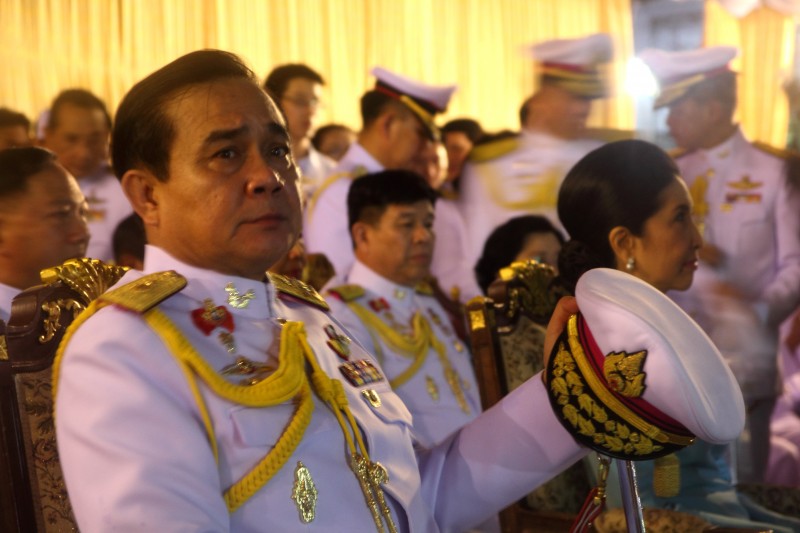 [1]
[1]National Council for Peace and Order leader Gen. Prayuth Chan-Ocha during a ceremony for Queen Sirikit's 82nd birthday on Aug. 12, 2014. Photo by John Vincent. Copyright Demotix
Prayuth Chan-ocha, the commander of the Royal Thai Army which staged a coup [2] last May and installed a government known as the National Council for Peace and Order (NCPO), has been selected [3] by the National Legislative Assembly as Thailand’s 29th prime minister. Prayuth is also the chairman of the NCPO.
It was the NCPO that appointed members of the legislative assembly who voted Prayuth to be prime minister. There were no other nominees for the position.
Despite having no experience in governance, Prayuth assumed several positions as head of the NCPO. He appointed himself as chairman of the Board of Investment, the National Energy Policy Committee, and the Special Economic Zone Development Committee.
New PM Gen Prayuth vows to devote himself to work with integrity http://t.co/P5s6HsI58c [4] pic.twitter.com/P1Yln4ajix [5]
— ThaiPBS English News (@ThaipbsEngNews) agosto 25, 2014 [6]
The army led by Prayuth launched a coup last May in a bid to end the violent clashes between supporters of the country’s major political parties. The army nullified the constitution, detained hundreds of politicians, and controlled the newsroom of major media stations. It also outlawed protests and the public gathering of five or more people.
Prayuth promised to hand over power back to the civilian government only after substantial political and electoral reforms have been implemented. The NCPO drafted [7] an interim constitution to restore normalcy in the country, but critics pointed out that it only legitimized the massive role of the army in the government.
During his first speech as prime minister, Prayuth vowed [8] to bring back happiness [9] to the people:
Let me give a promise to the people that I will fully dedicate myself as I carry out my duties. I will be honest, transparent, and I will uphold the interest of the nation and the people as the priority … in order to restore happiness and peace to the people.
The king of Thailand has already endorsed [10] Prayuth, boosting the credibility of the army chief since the king is the country’s most respected and beloved public figure.
On Twitter, journalist Pravit Rojanaphruk underscored that Prayuth is an unelected prime minister
What should we call Prayuth now? Junta leader, Army Chief and unelected Prime Minister of Thailand Gen. Prayuth Chan-ocha. #Thailand [11]
— Pravit Rojanaphruk (@PravitR) August 21, 2014 [12]
Who is the most powerful person in Thailand now? a) Army Chief b) Junta leader c) the new Prime Minister . #Thailand [11] #ThaiCoup [13]
— Pravit Rojanaphruk (@PravitR) August 21, 2014 [14]
Prayuth’s dictatorial influence in the bureaucracy was recently demonstrated when nobody dared to disagree with him after he presented the country’s proposed 2015 national budget:
Junta leader, Gen Prayuth asked whether anyone in military-appointed parliament disagree with him yesterday, of course no one dares disagree
— JohnP (@JohnP1752) August 19, 2014 [15]
Former Prime Minister Abhisit Vejjajiva and leader of the Democrat Party compared Prayuth’s coup with the 1957 coup, which also imposed [16] an absolute control in the whole government. Meanwhile, Thai scholar Claudio Sopranzetti wrote [17] that Prayuth’s political decisions are different from the overall strategy used by previous coup leaders in the past two decades:
I think Prayuth is making a personal attempt to assume the type of charismatic authority with popular support that none of the opposition governments in the last 20 years have been able to achieve.
Brad Adams, Asia director of Human Rights Watch, criticized the appointment of Prayuth and called [18] it a “dark day for human rights.” “As both prime minister and junta leader, Gen. Prayuth can wield broad power without accountability. This marks a dark day for human rights and the future of democracy in Thailand,” he said.
Despite his appointment as prime minister, Prayuth announced that martial law will remain in Thailand. He has scheduled an election in October 2015, but this is still tentative because political reforms must first be implemented according to the standards set by the army.